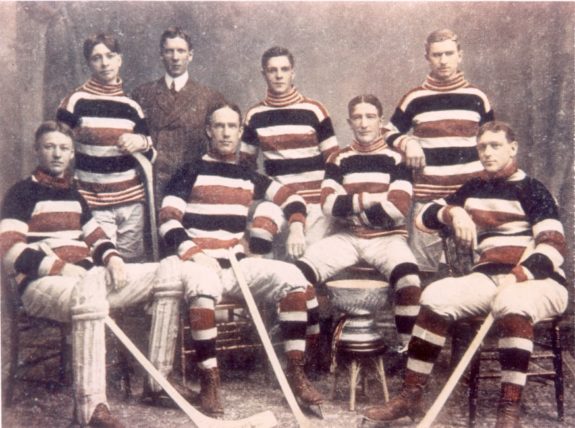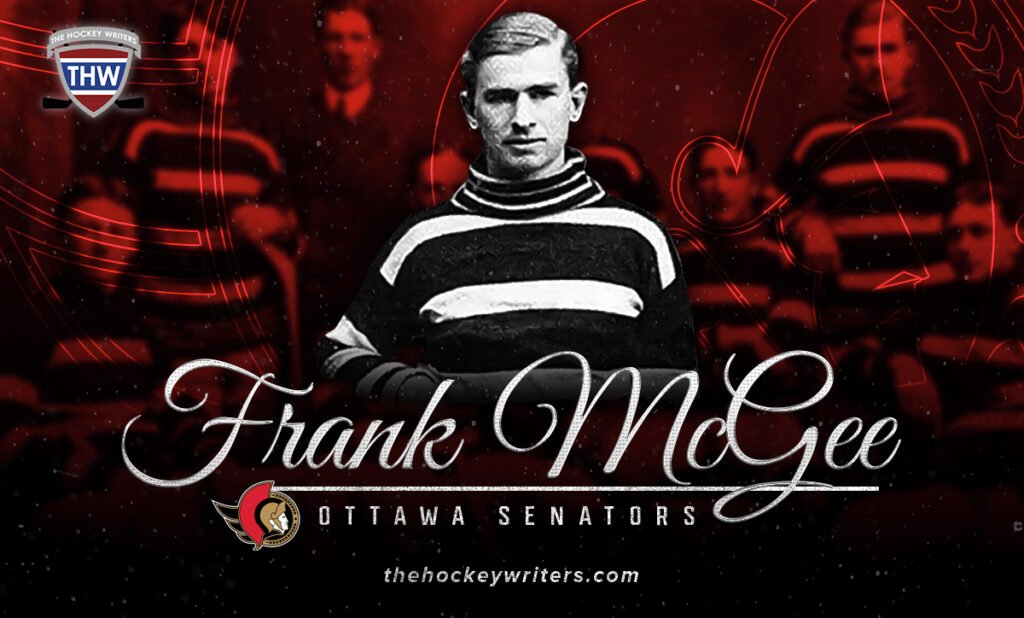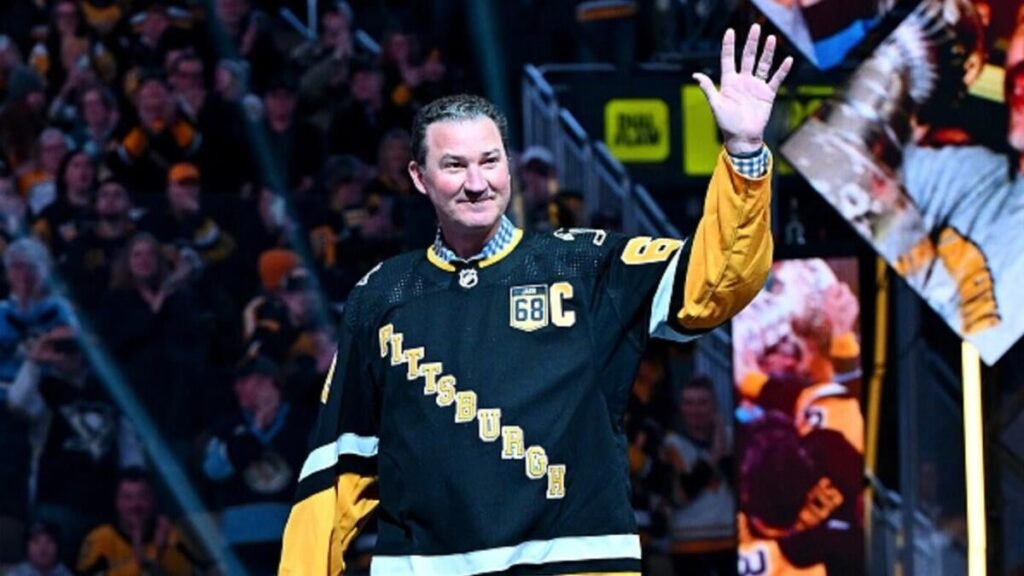On Oct. 8, 1992, the Ottawa Senators hit the ice for the first time in nearly 60 years, joining the modern NHL as an expansion team. Since then, the team has been searching for a player to bring the Stanley Cup to the nation’s capital. At first, it looked like it might be Alexei Yashin or Alexandre Daigle, but Daniel Alfredsson and Jason Spezza usurped them as the true faces of the franchise and came within three games of taking home the Cup. Then Erik Karlsson took the reins, propelling the Senators to the 2017 Eastern Conference Final before a trade halted the team’s momentum, and he was replaced with the trio of Brady Tkachuk, Jake Sanderson, and Tim Stutzle who may be young but just recently broke the team’s seven-year playoff drought.
However, almost 90 years before Ottawa returned to the NHL, the Senators were led by Frank McGee. With him at the helm, the team successfully defended the Stanley Cup for three-straight years, earning them the nickname of the “Silver Seven.” Few teams have been as dominant as the 1903-06 Senators, and much of it was thanks to their fearless leader, who not only was the face of his team but also the city in which he played. Although his reign was short, he was easily the Senators’ first franchise player.
The Birth of the Senators
After the first indoor game was played in 1875 in Montreal, hockey’s popularity skyrocketed across Canada. It didn’t take long for the first teams to start popping up, many of which competed at the 1883 Montreal Winter Carnival, which hosted the first hockey tournament. At that fateful event, Ottawans Jack Kerr, Halder Kirby, and Frank Jenkins found themselves thinking they could beat those teams on the ice, so they formed own team. Simply dubbed the Ottawa Hockey Club, they became the first team in both Ottawa and Ontario. However, that also meant they had no competition, so for the first three years, they played in the Montreal Winter Carnival. But it wasn’t long before leagues began popping up all over Eastern Canada, and more often than not, the Ottawa HC was on the ground floor as a founding member.
It didn’t take long for the Ottawa HC to leap to the top of Ontario hockey. From 1890-92, the team lost just two of their 14 matches and outscored their opponents 54-18, leading to back-to-back Ontario Hockey Association (OHA) titles. During the celebration following the 1892 season, Lord Stanley of Present, Canada’s Governor General, sent the team a letter. After watching a game at the 1899 Montreal Winter Carnival, he, too, became hooked on the sport, using his office to promote and support the game as much as possible. After Ottawa’s dominance, he felt that there needed to be a challenge Cup that would determine the greatest team in Canada.
Related: Ottawa Senators Legend – Frank Finnigan
Ottawa maintained its dominant record in 1893; after 10 games, the team racked up a total score of 55-26 and took home its third OHA Cosby Cup. However, Ottawa failed to claim the first Dominion Hockey Challenge Cup donated by Lord Stanley, falling in the standings to the Montreal HC. Despite the disappointing loss, Ottawa was fully in the public consciousness. Whether due to their connection to parliament or the governor general, the team began being referred to as the Senators, and while reports still referred to them as the ‘Ottawas,’ the new nickname stuck.
Frank McGee, Hockey’s First Superstar
Born in 1882, McGee was one of five sons of John McGee, a Clerk of the Privy Council, the highest civil service job in the country, and the nephew of Thomas D’Arcy McGee, one of the fathers of Canadian Confederation. With such a recognizable name, he was a shoo-in for the political sphere, and after graduating, he joined the Department of Indian Affairs. It also didn’t hurt that he was a good-looking young man. In his book, Klondikers: Dawson City’s Stanley Cup Challenge, Tim Falconer wrote, “The scion of an illustrious and influential family, he was a clean-cut man with blond hair, blue eyes, and fine features, and a dapper dresser on and off the ice” (pg. 223).
But McGee was more than just a pretty face. He was also a natural athlete, excelling at lacrosse, rugby, football, and hockey. It was, of course, the latter sport for which he earned widespread praise. In 1897, the Ottawa Journal reported, “F. McGee of College forward line showed himself to be a coming man. He is an excellent stick handler and a fine skater” (pg. 225). Other reports declared him one of the best players in the city and the most skilled player on the ice.
However, McGee’s hockey career almost ended before it started when a puck struck him above the eye in an 1899 game. Luckily, the injury only required a few stitches, and he returned to the ice and finished the game. A year later, he was struck again above the eye in a charity game, but this time, the injury was more significant and resulted in significant vision loss in that eye. Rather than risk damaging his good eye or worse, losing an eye entirely, he took a step back from hockey and, for two years, pursued his political career while refereeing matches on the side. But the love of the game pulled him back, and in 1903, he began practicing with the Senators.
In his first game as a Senator on Jan. 17, 1903, fans would never have known McGee was partially blind. He was electric on the ice, flying past defenders and using a flurry of quick movements to set goalies off balance to give him a wide-open net. He scored twice against Montreal to help the Senators win 7-1, then scored another two goals against Quebec in a 6-8 loss. By his fourth game, he already led the team with 10 goals, and when the season ended in February, he was second in the league with 14.
McGee’s dominance helped push the Senators into first place over the Montreal Victorias to claim their first Stanley Cup in franchise history, but his reputation also attracted challenges. Two days after securing the Cup, the Rat Portage Thistles issued a challenge against the Senators. Rat Portage’s goalie, Fred Dulmage, knew what they were getting into, saying, “That McGee is a wonder and we are more afraid of him than any of your other forwards, but you may rest assured that Ottawa will never run up eight goals on us” (pg. 228-9). He was correct – the Senators never scored more than six in a game. But McGee led the two-game series with four goals, and the Senators easily defended their title.
While McGee’s accomplishments paint a picture of a pure finesse player like Pavel Bure, he was much more similar to the Senators’ current captain. He was as strong as he was skilled and loved to throw punishing checks, but frequently crossed the line due to his intense competitiveness. Early hockey pioneer Frank Patrick commented that McGege had “an almost animal rhythm” to his game and a report from the Journal recounted his intensity, writing, “F. McGee is a very aggressive player, in fact, just a little too much so and in consequence he generally decorates the side of the rink about half the time” (pg. 231).
After the 1903 Stanley Cup victory, team owner Bob Shillington gifted each player on the team a silver nugget. Inspired by a recent silver discovery in Cobalt, Ontario, and the fact that he was an investor in the new mine, he wanted to show his appreciation of the Senators’ dominance. The gift gave rise to the now-legendary name, “The Silver Seven.”
The Silver Seven Era
The gift of the silver nuggets pinpointed the beginning of one of the most dominant eras of hockey. From 1903-06, the Senators were nearly unbeatable, losing just two regular-season games in three years. They were even harder to beat in Stanley Cup challenges, turning away the Winnipeg Rowing Club, Toronto Marlboros, Montreal Wanderers, Brandon Wheat Kings, Dawson City Nuggets, Rat Portage, Queen’s University, and Smiths Falls before finally losing the Cup to the Wanderers on March 17, 1906. However, even then, the Senators split the two-game series with Montreal and only lost the challenge by goal differential, falling behind by just two goals.

There’s no question that the Senators were a strong all-around team, and the veteran roster with McGee turned them into a powerhouse. Team captain Harvey ‘Slugger’ Pulford was one of the best checkers in the game and an incredible athlete; according to Gordie Howe, “If not for Lionel Conacher, Pulford would likely have been named Canada’s top male athlete of the first half of the 20th century.” Harry ‘Rat’ Westwick was also one of the best rovers at the turn of the century; fast, tough, and awful to play against, with a Quebec newspaper writing that he was a “miserable, insignificant rat.” Goalie John ‘Bouse’ Hutton loved the thrill of danger, smiling when pucks flew towards him. Billy Gilmour, one of three brothers to suit up for Ottawa, was arguably one of the best stickhandlers of his era. All four are in the Hockey Hall of Fame.
But it was McGee who became the face of the young franchise. In almost every series, the spotlight was squarely on him, and he rarely disappointed. In a 1905 Stanley Cup game against Dawson City, he scored a record 14 goals en route to a 23-2 rout, eight of which were scored in eight minutes and three were scored within 90 seconds of each other. In the second challenge from Rat Portage, he scored the game-winner with a broken wrist. His 64 goals would rank 31st among all-time playoff totals, ahead of Bobby Hull and Phil Esposito, but it’s almost unfathomable to think he scored that in just 22 appearances.
“If McGee had played a century later,” wrote Falconer, “he’d have been a promotional dream for the game: a dynamic player who was handsome and always presentable; was intelligent and cultured; bore a prestigious name; was a bit of a character; and, best of all, had the reputation of a winner” (pg. 232). Ottawa’s core of veterans needed a superstar who could play all aspects of the game, from fast and dangerous to heavy-hitting and dirty, and McGee provided one.
McGee’s Legacy
Following the Senators’ loss to the Wanderers in 1906, McGee retired from hockey and returned to his political career he had neglected during his playing days. No amount of convincing could bring him back to hockey; he’d already hit the highest highs for an amateur player, and now he needed to get back to work.
McGee enlisted in the army ahead of the World War I, passing the eye exam by cleverly switching which eye was covered to hide the fact that he couldn’t see out of one. His ingenuity and dedication helped him quickly climb the ranks, making lieutenant by the time his regiment was called up to action in 1914. He suffered a knee injury in a battle in December 1915 that should have ended his military career, but just like in his hockey-playing days, he returned to action in August 1916. A month later, he was killed in action at the Battle of the Somme, and his body was never found. His name, along with all the other lost Canadian soldiers, is commemorated on the Vimy Ridge Memorial in France.
McGee was one of the nine players who made up the inaugural Hall of Fame class in 1945, and in 1966, he was one of the first people inducted into the Ottawa Sports Hall of Fame. Although his career is almost painfully short, lasting just three brief seasons, he’s remembered as one of the greatest pre-NHL players of all time, leaving an immeasurable impact on the sport. He is why the original Senators are remembered as one of the greatest teams of all time, and without him, the modern franchise may never have existed.
Note: Page numbers refer to the book Klondikers: Dawson City’s Stanley Cup Challenge, by Tim Falconer (ECW Press – 2021).




